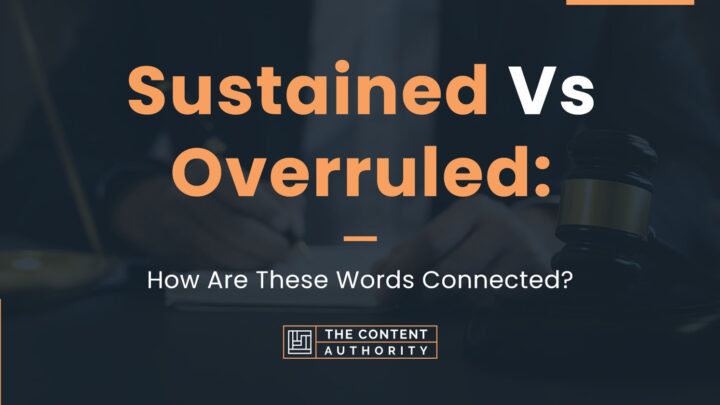Sustained and overruled are among the most popular legal terms. You will often hear them during court proceedings in real life and movies. But the main question is, how do we differentiate sustained vs. overruled?
When a judge says “sustained” to an attorney’s objection, it means that “there is validity to what the attorney objects.” Therefore, this word affirms the validity of a complaint. In contrast, “overruled” means “to reject or annul an objection.” Overrule also means “to disallow/reject a decision.”
During court proceedings, you will often hear the word “objection” from the lawyers. Usually, the judge responds by saying “overruled” or “sustained.” Read this post to the end to find out what these responses mean.

Definitions of Sustained and Overruled
Law is one of the most complex subjects because of its jargon. However, whether you are a law practitioner or not, you may benefit from understanding the meanings of words like “sustained” and “overruled.” One can argue that these are the most overused legal terms in existence. For instance, you may hear them in real-life court proceedings, movies, and TV shows. So, let us learn about their definitions in this section:
Definition of Sustained
In trial practice, sustained means “approved.” A judge uses this word to approve or verify the validity of an objective brought forward by a defense attorney. For example, if a lawyer objects to an attorney’s question to their client during trial proceedings and the judge says sustained, the other attorney cannot ask the question. Here is an example in a sentence, “The judge sustained Johnny’s objection during the mock trial.”
Sustained is the simple past tense and past participle of “sustain.” Sustain means “to keep in existence, keep up, prolong, continue, supply with necessities, or support vitality.” Let’s look at a sentence example, “The nutrients sustained the plants during the drought.”
As an adjective, “sustained” means “held continuously at a certain level.” For example, in a sentence, “The co-pilot sustained the flight while his workmate received medical assistance.”
Sustained also means to maintain at length without interruption or weakening. Here is a sentence example, “The medicine sustained his heartbeat as the doctors prepared a long-term intervention.
In Music, sustained means “held at a certain pitch.” For example, in a sentence, “The choir sustained the tune for over two minutes, which was quite impressive.” Another meaning for sustained is to keep experiencing or suffering injuries from an accident. For example, “My son sustained minor injuries from the crash.”
Definition of Overruled
In trial practice, overruled means “to reject an attorney’s objection to a question of a witness or the admission of a piece of evidence.” The judge usually decides whether to overrule an objection or not.
Here is a sentence example, “The crowd in the courtroom shouted angrily when the judge overruled the admission of the DNA evidence in the Chris Watts trial.”
Overrule is also the simple past tense and past participle of “overrule.” Overrule means “to rule over, govern, determine by superior authority, or nullify a ruling by a higher power.” For example, in a sentence, “The High Court overruled the election results in Texas.”
How to Properly Use Sustained and Overruled in a Sentence
You can use these words when explaining courtroom proceedings. Furthermore, you can use them in scenarios outside the legal or justice system. The key is to understand their definitions and application contexts. This section will help you know the correct application of “sustained” and “overruled” in sentences:
How to Use the Word Sustained
Use this word in a sentence as the simple past tense or past participle of sustain. In a sentence, “The farmers sustained their plants with water from the artificial dam during the drought.”
You can also use it as an adjective in the following contexts:
Meaning “held continuously at a certain level.” For example, “The guard sustained the new security protocols throughout the year.”
Meaning “held at a certain pitch.” For example, “Hanna surprised everyone when she sustained the tone throughout the recital.”
As an adjective, this word helps you indicate the quantity or extent of a named item. For example, “The pills sustained John’s blood pressure levels.” In this sentence, the adjective “sustained” indicates the extent or quantity of the “blood pressure levels.”
The word “sustained” has two syllables, “sus-tained.” The stressed syllable in “sustained” is “tained.” So, its proper pronunciation is “/suss-taynd/.” This knowledge will help you when using this word verbally.
How to Use the Word Overruled
Use this word as a verb when referring to a decision made by a judge to reject an attorney’s objection to a question to a witness or evidence admission. For example, “Jane is mad at me because I overruled her objection at the mock trial.”
You can also use it as the simple past tense of the past participle of the word overrule. For example, “The Queen overruled the Prime Minister’s mental health bill.” In this case, you must apply the definitions of “overrule” and how you can use it in various contexts.
The word “overruled” has three syllables, “o-ver-ruled.” So you can pronounce it by breaking it into syllables and learning to say them separately, then together. Doing so comes in handy when using this word in verbal conversations.
Sustained Vs. Overruled: More on These Words Connection
The primary connection between these words is that they are applied in trial practice or court proceedings. When an attorney says “objection” to a question asked to a witness or an evidence’s admission, the judge can respond with “sustained” if he agrees with the objection or “overruled” if he does not.
Another connection is that they are simple past tense and past participles of other words (sustain and overrule.) So, to understand them, it would be wise to research the words “sustain” and “overrule.” A past participle is a word formed from a verb that usually ends with “ed, d, en, t, or n.” In contrast, a simple past tense describes a completed activity that took place in the past.

List of Examples of Sustained and Overruled Use in Sentences
People do not learn new words just for the sake of knowing them. Instead, most people aim to expand their vocabularies. Are you still shy about using these words for the first time? Here are a few sentences to inspire you to use these words:
Example sentences with the word sustained
- That large building sustained a large population in the 12th century.
- The judge sustained the validity of Depp’s lawyers’ objection.
- The United Kingdom has sustained itself against the constant attacks on its monarchs.
- Our pilot experienced a medical emergency during the flight, but his co-pilot managed to sustain the plane.
- The communities of farmers sustained so many losses from climate change in 2021.
Example sentences with the word overruled
- I used my veto to turn the tables on my sister, but my mother overruled it.
- The Justice Department overruled the court’s decision to let go of the “law bandit.”
- Joe retired from the negotiations after the council overruled his position.
- Amber’s lawyer tried to dismiss the video evidence, but the judge overruled him.
- It is no coincidence that the judge overruled the D. A’s evidence after receiving a call from the defendant’s billionaire father.
Conclusion
I am sure you have heard the words “overruled” and “sustained” in trials and court proceedings in movies and real-life contexts. If you ever wondered what they mean, now you know. Furthermore, this post explains other meanings of this word that you probably didn’t know existed. Go ahead and practice the word to perfect your understanding and usage.
Shawn Manaher is the founder and CEO of The Content Authority. He’s one part content manager, one part writing ninja organizer, and two parts leader of top content creators. You don’t even want to know what he calls pancakes.

